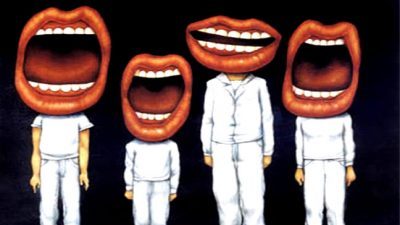Yes, plants can produce sounds when they are stressed by heat or drought or damage.
They can also produce sounds when they are swayed by the wind, and when their fruit drops to the ground.
They can also produce sights when their leaves unfurl, and when they flower.
And they can produce scents too.
And, yes, animals can detect those sounds and sights and scents, and can use them, for their own advantage (if they eat the plant), or for mutual advantage (e.g., if they are pollinators).
Plants can also produce chemical signals, for signalling within the plant, as well as for signalling between plants.
Animals (including humans) can produce internal signals, from one part of their immune system to another, or from a part of their brain to another part, or to their muscles or their immune system.
Seismic shifts (earth tremors) can be detected by animals, and by machines.
Pheromones can be produced by human secretions and detected and reacted to (but not smelled) by other humans.
The universe is full “signals,” most of them neither detected nor produced by living organisms, plant or animal.
Both living organisms and nonliving machines can “detect” and react to signals, both internal and external signals; but only sentient organisms can feel them.
To feel signals, it is not enough to be alive and to detect and react to them; an organ of feeling is needed: a nervous system.
Nor are most of the signals produced by living organisms intentional; for a signal to be intentional, the producer has to be able to feel that it is producing it; that too requires an organ of feeling.
Stress is an internal state that signals damage in a living organism; but in an insentient organism, stress is not a felt state.
Butterflies have an organ of feeling; they are sentient.
Some species of butterfly have evolved a coloration that mimics the coloration of another, poisonous species, a signal that deters predators who have learned that it is often poisonous.
The predators feel that signal; the butterflies that produce it do not.
Evolution does not feel either; it is just an insentient mechanism by which genes that code for traits that help an organism to survive and reproduce get passed on to its progeny.
Butterflies, though sentient, do not signal their deterrent color to their predators intentionally.
Nor do plants that signal by sound, sight or scent, to themselves or others, do so intentionally.
All living organisms except plants must eat other living organisms to survive. The only exceptions are plants, who can photosynthesize with just light, CO2 and minerals.
But not all living organisms are sentient.
There is no evidence that plants are sentient, even though they are alive, and produce, detect, and react to signals.
They lack an organ of feeling, a nervous system.
Vegans need to eat to live.
But they do not need to eat organisms that feel.
Khait, I., Lewin-Epstein, O., Sharon, R., Saban, K., Perelman, R., Boonman, A., … & Hadany, L. (2019). Plants emit informative airborne sounds under stress. bioRxiv 507590.
Wilkinson, S., & Davies, W. J. (2002). ABA‐based chemical signalling: the co‐ordination of responses to stress in plants. Plant, cell & environment, 25(2), 195-210.
SIGNAUX ET SENTIENCE
Oui, les plantes peuvent produire des sons lorsqu’elles sont stressées par la chaleur, la sécheresse ou les dommages.
Elles peuvent également produire des sons lorsqu’elles sont agitées par le vent et lorsque leurs fruits tombent au sol.
Elles peuvent également produire des vues lorsque leurs feuilles se déploient et lorsqu’elles fleurissent.
Et elles peuvent aussi produire des parfums.
Et, oui, les animaux peuvent détecter ces sons, ces vues, et ces odeurs, et ils peuvent les utiliser, pour leur propre avantage (s’ils mangent la plante) ou pour un avantage mutuel (s’ils sont des pollinisateurs).
Les plantes peuvent également produire des signaux chimiques, pour la signalisation à l’intérieur de la plante, ainsi que pour la signalisation entre les plantes.
Les animaux (y compris les humains) peuvent produire des signaux internes, d’une partie de leur système immunitaire à une autre, ou d’une partie de leur cerveau à une autre partie, ou à leurs muscles ou à leur système immunitaire.
Les déplacements sismiques (tremblements de terre) peuvent être détectés par les animaux ainsi que par les machines.
Les phéromones peuvent être produites par les sécrétions humaines et elles peuvent être détectées et réagies (mais non sentis) par d’autres humains.
L’univers est plein de « signaux », dont la plupart ne sont ni détectés ni produits par des organismes vivants, végétaux ou animaux.
Les organismes vivants et les machines non vivantes peuvent « détecter » et réagir aux signaux, qu’ils soient internes ou externes ; mais seuls les organismes sentients peuvent les ressentir.
Pour ressentir des signaux, il ne suffit pas d’être vivant, de les détecter et d’y réagir ; il faut un organe du ressenti : un système nerveux.
La plupart des signaux produits par les organismes vivants ne sont pas non plus intentionnels ; pour qu’un signal soit intentionnel, il faut que le producteur puisse ressentir qu’il le produit ; cela aussi exige un organe du ressenti.
Le stress est un état interne qui signale des dommages dans un organisme vivant ; mais dans un organisme non sentient, le stress n’est pas un état ressenti.
Les papillons ont un organe du ressenti ; ils sont sentient.
Certaines espèces de papillons ont évolué une coloration qui imite la coloration d’une autre espèce vénéneuse, un signal qui dissuade les prédateurs qui ont appris que c’est souvent toxique.
Les prédateurs ressentent ce signal; les papillons qui le produisent ne le ressentent pas.
L’évolution darwinienne ne ressent pas non plus ; c’est juste un mécanisme non sentient par lequel les gènes qui encodent les traits qui aident un organisme à survivre et à se reproduire sont transmis à sa progéniture.
Les papillons, bien que sentients, ne signalent pas intentionnellement leur couleur dissuasive à leurs prédateurs.
Les plantes qui signalent par le son, la vue ou l’odeur, à elles-mêmes ou aux autres, ne le font pas non plus intentionnellement.
Tous les organismes vivants, à l’exception des plantes, doivent manger d’autres organismes vivants pour survivre. Les seules exceptions sont les plantes, qui peuvent effectuer la photosynthèse avec juste de la lumière, du CO2 et des minéraux.
Mais tous les organismes vivants ne sont pas sentients.
Il n’y a pas de preuve que les plantes soient sentientes, même si elles sont vivantes, et produisent, détectent et réagissent aux signaux.
Il leur manque un organe de ressenti, un système nerveux.
Les véganes nécessitent manger pour survivre.
Mais ils ne nécessitent pas manger les organismes qui ressentent.
Khait, I., Lewin-Epstein, O., Sharon, R., Saban, K., Perelman, R., Boonman, A., … & Hadany, L. (2019). Plants emit informative airborne sounds under stress. bioRxiv 507590.
Wilkinson, S., & Davies, W. J. (2002). ABA‐based chemical signalling: the co‐ordination of responses to stress in plants. Plant, cell & environment, 25(2), 195-210.





